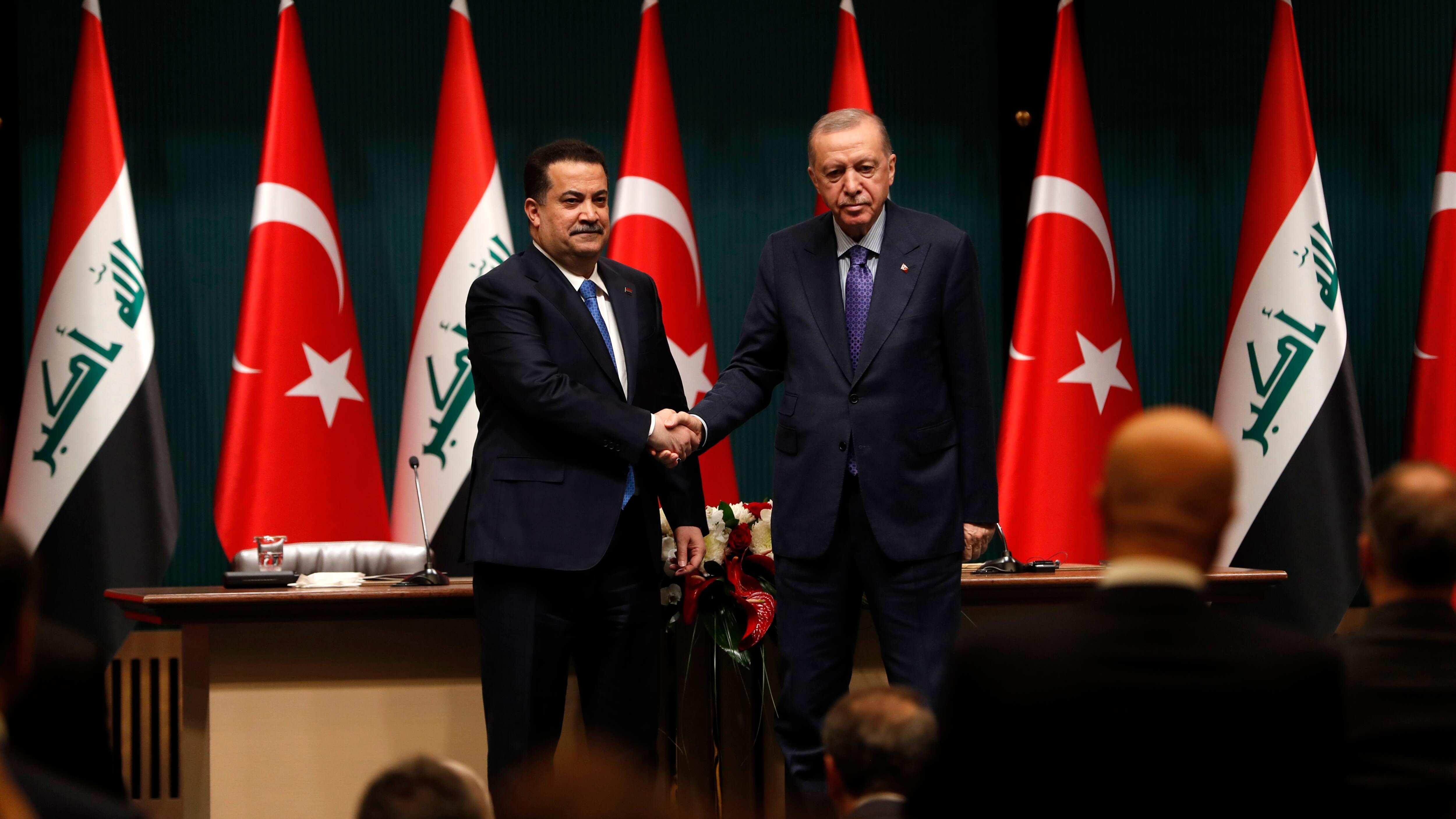
President Recep Tayyip Erdoğan declared on Thursday, May 8, that the Development Road Project, a joint initiative with Iraq, will significantly enhance stability and prosperity across the region, during a joint news conference with Iraqi Prime Minister Mohammed Shia al-Sudani in Ankara.
The Development Road Project, a 1,200-kilometer rail and road corridor linking Iraq’s Al-Faw Grand Port to Türkiye’s border, aims to boost trade and connectivity between Asia and Europe.
“This project will make a significant contribution to the stability and prosperity of Iraq and the entire region,” Erdoğan said, inviting other nations to participate in the strategic initiative. Al-Sudani described it as a “major opportunity” to deepen Türkiye-Iraq integration, emphasizing its potential to reshape regional economics.
The leaders committed to accelerating the project’s implementation and discussed resuming oil exports through the Iraq-Türkiye Oil Pipeline, stalled since March 2023 due to legal disputes.
Erdoğan highlighted the 2024 Water Framework Agreement, which supports joint infrastructure projects, and noted that bilateral trade reached $18 billion last year. “We are focused on implementing joint projects, including the rehabilitation of infrastructure,” he added.
Security cooperation was a central theme, with both leaders reaffirming their resolve to combat terrorism.
Erdoğan reaffirmed their determination to continue the fight against PKK, FETÖ, and ISIL, which threaten both Türkiye’s and Iraq’s national security.
Al-Sudani reinforced Iraq’s position, saying, “The PKK is a banned organization in Iraq, and we do not allow any group to use our territory to attack Türkiye.”
The meeting also addressed regional challenges, including Syria, Palestine, and India-Pakistan tensions.
Erdoğan underscored that Iraq’s stability is inseparable from Türkiye’s, advocating for stronger Iraq-Syria relations to ensure peace. Al-Sudani called for an inclusive Syrian government to safeguard minority rights and counter the persistent threat of ISIL, noting recent discussions with Syrian President Ahmad al-Sharaa.
Both leaders condemned Israel’s actions in Gaza, labeling them a “massacre” and warning of a catastrophic famine due to blocked humanitarian aid.
“Israel’s aggressive policies will drown the region in blood and instability,” Erdoğan said, pledging with Al-Sudani to intensify pressure on Israel. Al-Sudani affirmed their shared stance, stating, “We stand in solidarity and agree that attacks on Gaza must stop.”
Economic collaboration extended to energy, banking, industry, and education. Al-Sudani announced plans for Turkish private sector partnerships to establish industrial zones and factories in Iraqi cities, aiming to boost trade.
“Türkiye is one of Iraq’s biggest trade partners, and we are adjusting regulations to enhance bilateral trade,” he said. Erdoğan expressed Türkiye’s interest in deepening cooperation in electricity and natural gas.
Erdoğan praised Al-Sudani’s leadership for advancing regional stability and commended the Iraqi Turkmen community for strengthening bilateral ties.
“We do not view our relations with Iraq as merely bilateral state affairs but as a requirement of our fraternal bond,” he said, emphasizing the deep historical and cultural ties between the two nations.
On the India-Pakistan crisis, Erdoğan reiterated Türkiye’s efforts to defuse tensions, stating, “Ankara is working to prevent the crisis from reaching the point of no return, despite efforts by some to inflame it.”
The leaders also expressed a shared commitment to addressing the humanitarian crisis in Gaza and supporting stability in Syria and Lebanon.
Türkiye, Iraq ink 11 pacts on key sectors
Türkiye and Iraq on Thursday signed 11 pacts, including information and communication technologies, the defense industry, and higher education, following the meeting between Erdoğan and Al-Sudani.
An agreement on standard implementation procedures for the voluntary return and reintegration of Iraqi nationals was signed by Türkiye’s Directorate General of Combating Irregular Migration and Removal Affairs and Iraq's Migration Affairs Department at the Migration and Displacement Ministry.
A memorandum of understanding (MoU) on training cooperation was signed by the interior ministries of both countries.
Another MoU on training cooperation was signed between the Gendarmerie General Command of Türkiye’s Interior Ministry and the Iraqi Interior Ministry.
An agreement on combating the illicit trafficking of narcotics and psychotropic substances was signed by the two countries.
In the field of disaster and emergency management, Türkiye’s Disaster and Emergency Management Authority (AFAD) and Iraq's National Center for Crisis and Disaster Management at the Ministry of Interior signed an MoU.
The two countries also expanded a 2009 agreement on information and communication technologies through an additional protocol signed by officials from Türkiye's Transport and Infrastructure Ministry and Iraq's Communications Ministry.
Another MoU was signed between AYDA International Integrated Defense Systems and Iraq's Al Zaman group for General Trading Contracting and Shipbuilding L.L.C.
In higher education, Türkiye's Council of Higher Education and Iraq's Ministry of Higher Education and Scientific Research agreed to establish branches and educational programs for Turkish universities in Iraq.
Türkiye’s Industry and Technology Ministry and Iraq's Ministry of Planning signed a cooperation agreement in metrology.
Türkiye’s National Defense Ministry and Iraq Military Industry Commission signed an MoU for indigenization in the defense industry.
The justice ministries of both countries signed an MoU for legal cooperation.